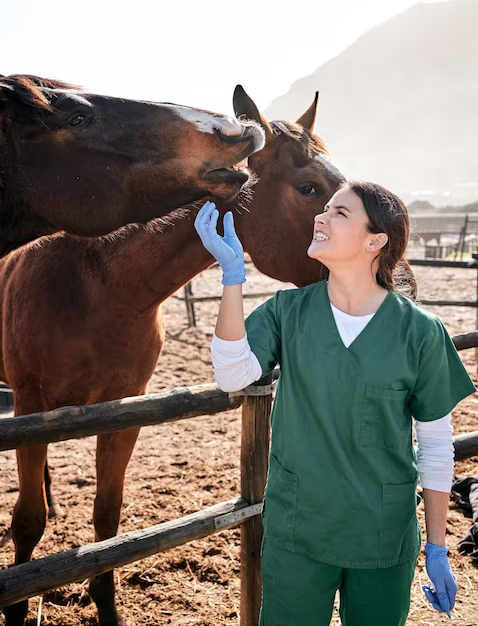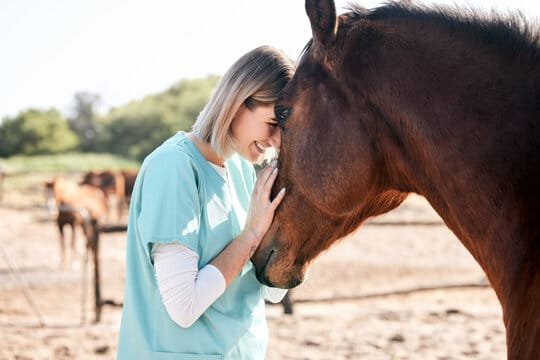If your horse isn’t eating, it can be a sign of an underlying health issue, and it’s important to address it as soon as possible.
Horses can be particularly sensitive, and refusal to eat can indicate stress, illness, or a variety of other problems. Here’s a guide on what to do if your horse won’t eat and how to handle the situation:
1. Check for Medical Issues:

A lack of appetite in a horse can be caused by various medical conditions. It’s crucial to look for signs that might indicate a health problem:
- Colic: Colic is a common and serious cause of a horse refusing to eat. Colic can cause stomach pain, bloating, and discomfort, making your horse reluctant to eat. If your horse shows signs of distress like pawing, rolling, or looking at their abdomen, call a vet immediately.
- Dental Problems: Horses with dental issues, such as sharp points or loose teeth, may have difficulty chewing and swallowing food, making them hesitant to eat. Watch for signs of drooling, food dropping from the mouth, or avoiding certain types of feed.
- Gastric Ulcers: Horses with gastric ulcers might not feel like eating due to stomach pain. These ulcers are common in horses under stress, especially in those with irregular feeding patterns or heavy exercise.
- Infections or Illness: If your horse has an infection (like a respiratory infection) or is experiencing a fever, it can lead to a loss of appetite. Keep an eye on their temperature, behavior, and other symptoms like nasal discharge or coughing.
- Liver or Kidney Problems: Liver and kidney issues can lead to lethargy and a decrease in appetite. Horses may also show signs like weight loss, jaundice (yellowing of the eyes or gums), or increased drinking and urination.
2. Check for Stress or Environmental Changes:
Horses are creatures of habit, and any changes in their environment can lead to stress that affects their appetite. Consider the following:
- Change in Routine: Has there been a recent change in feeding time, location, or the people taking care of your horse? Horses are sensitive to changes in their daily routine and might refuse to eat if they feel stressed or anxious.
- Changes in Barn or Paddock: New horses, changes in herd dynamics, or being separated from other horses can cause stress. Horses are social animals, and isolation can affect their mood and eating habits.
- Travel or New Locations: If you’ve recently traveled or moved your horse to a new location, the unfamiliar surroundings may cause anxiety, which can result in a loss of appetite.
- Weather Changes: Extreme weather (hot, cold, or very rainy conditions) can make horses less inclined to eat. Make sure they have access to shelter, water, and hay in suitable conditions.
3. Check Feed Quality and Variety:
Sometimes, horses may refuse to eat if they find their feed unappealing, or if the feed has spoiled. Make sure to:
- Freshness of Feed: Check if the hay or grain is fresh. Old, moldy, or spoiled hay can cause digestive issues and a lack of appetite.
- Type of Feed: Horses can be picky eaters, and they may refuse to eat certain types of feed, especially if it’s a drastic change. Make sure you’re offering them something they enjoy. If you’re switching feed, do so gradually to avoid digestive upset.
- Taste Preferences: Some horses are simply picky about certain types of hay or grain. Try offering a different type of hay, or soaking the hay if it’s too dry, to see if that encourages them to eat.
- Lack of Salt or Electrolytes: Horses need access to salt or electrolyte supplements, especially if they’ve been working hard or sweating. If they’re lacking essential minerals, they may lose interest in eating.
4. Offer Extra Incentives:
Sometimes, your horse might need a little encouragement to start eating again. Try the following:
- Soaking the Hay: If your horse’s teeth are a concern, or if they are picky eaters, soaking hay can make it easier to chew and more palatable.
- Warm Water: Adding warm water to their grain or hay can make it more appetizing, especially in colder weather.
- Apple Cider Vinegar or Molasses: Adding a bit of apple cider vinegar or molasses to your horse’s feed can entice them to eat. Just be sure to do this in moderation, as excess sugar can lead to health issues.
- Offering Fresh Grass or Grass Hay: Fresh, soft grass or high-quality grass hay can be more enticing than dry or hard hay. If possible, allow your horse to graze in a safe area.
5. Monitor Hydration:
Horses that refuse to eat might also be reluctant to drink. Dehydration can worsen the situation, so it’s essential to monitor their water intake.
- Make sure fresh, clean water is always available.
- Try adding a salt block or electrolyte solution to encourage drinking, especially if your horse is dehydrated or has been sweating.
- Soak hay or add water to feed to make it easier for them to ingest moisture and stay hydrated.
6. Consult a Veterinarian:

If your horse’s lack of appetite persists for more than a day or two, or if they show any signs of pain, illness, or distress, it’s time to call the vet. A vet will be able to perform a thorough examination to determine the cause of the problem and recommend appropriate treatment. Diagnostic tests, such as blood work, ultrasounds, or endoscopy, may be necessary to rule out any serious conditions like colic, ulcers, or infection.
7. Take Preventive Measures:
To prevent future feeding problems, here are some things you can do:
- Maintain a Consistent Routine: Horses thrive on routine, so keep feeding times, locations, and handling as consistent as possible.
- Ensure Proper Dental Care: Have your horse’s teeth checked regularly by a vet or equine dentist. Dental problems are a common cause of loss of appetite in horses.
- Minimize Stress: Try to limit environmental stressors. Provide your horse with a calm and familiar environment to help them feel secure.
- Keep Their Feed Clean and Fresh: Always store hay and feed in a cool, dry place to prevent mold and spoilage.
If your horse refuses to eat, it’s important not to panic but to take it seriously. Start by checking for medical issues, assessing environmental stressors, and ensuring your horse’s feed is fresh and appealing. If the issue persists or if your horse shows other signs of distress, a veterinarian’s evaluation is essential. By staying observant and proactive, you can help your horse regain its appetite and stay healthy.




